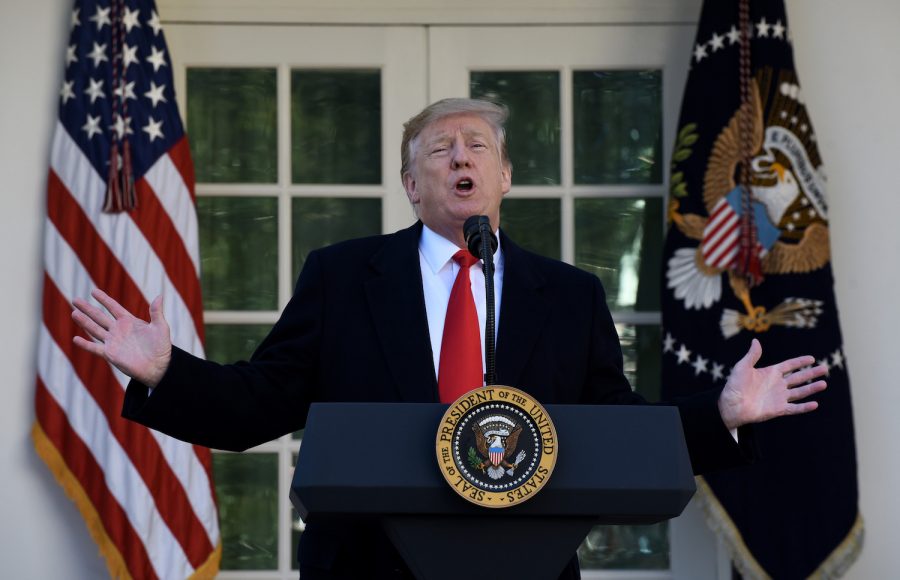Tietz: Trump declares national emergency: the boy who cried wolf?
Has Trump’s use of declaring national emergencies redefined executive powers or is it lessening the overall effect of a national emergency declaration?
Olivier Douliery/Abaca Press/TNS
President Donald Trump makes a statement announcing that a deal has been reached to reopen the government through Feb. 15 during an event in the Rose Garden of the White House Jan. 25, 2019 in Washington, D.C.
April 2, 2019
We in Iowa know that the emergency declarations are nothing less than severe. After excessive snowfall and freezing temperatures this winter, the recent warmer weather has caused severe flooding in more than 50 counties in the southwestern part of the state. Just a couple of weeks ago, Gov. Kim Reynolds requested a major disaster declaration from President Trump, which he approved for a majority of the counties that were requested. These federally approved declarations will give much-needed aid to Iowa counties for recovery in infrastructure as well as provide funding for initiatives that will prevent similar disasters in the future.
However, with the looming threat of a national emergency declared on the Southern border as a pouty response from Trump after Congress refused to support the costs of a border wall, Trump’s presidential ability to declare emergencies, national or otherwise, is seeming to become more of a rubber stamp rather than the official call to action that it is meant to be.
RELATED: McComas: Government of all levels has joined together to help Iowans affected by extreme flooding
The ability to declare emergencies are considered to be among the executive powers bestowed on the president in the Constitution. In 1976, Congress passed the National Emergencies Act to better define and limit the power the president has to make declarations and reallocate funding in the budget toward a pressing situation in the country. According to the Brennan Center for Justice, there have been 59 national emergencies declared to date.
Trump’s presidential ability to declare emergencies, national or otherwise, is seeming to become more of a rubber stamp rather than the official call to action that it is meant to be.
Most of these declarations were not questioned by Congress or the public, because they were broadly recognized as nonpartisan emergencies requiring immediate relief. The national emergency at the Southern border is the only declaration made by a president in order to fund a policy goal that did not pass in Congress.
RELATED: Trump declares border emergency, testing the limits of presidential authority
Is Trump’s declaration a viable solution for the border crisis? Or is using executive powers in an attempt to bypass congressional approval at the border a desperate way to keep his campaign promise of a wall? While there is no disagreement about needing a solution at our Southern border, the unprecedented use of a national emergency as a means to fund a policy is a pathetic route taken by the White House that I worry will lessen the severity and concern of future declarations.
RELATED: President Trump declares major disaster in 56 Iowa counties after flooding
After a record-setting federal government shutdown because Congress refused to approve $6 billion for Trump’s wall, it is pretty clear that the border wall is not a popular policy among Americans. The president’s persistence in doing whatever necessary, even if using his powers in a manner that is controversial and will ultimately end up in the courts, seems completely unproductive to me.
Emergency declarations are meant to be an immediate response by the federal government to allocate funds to a pressing issue somewhere in the country. They should not be used by the president to reallocate funding and maneuver around Congress. The more often that these emergency declarations happen, the less of an emergency each one becomes.




















